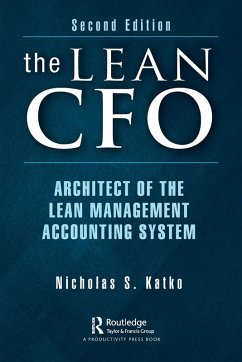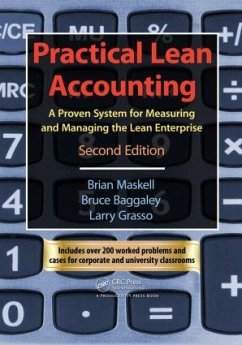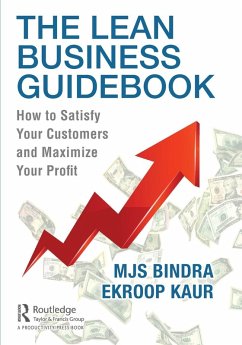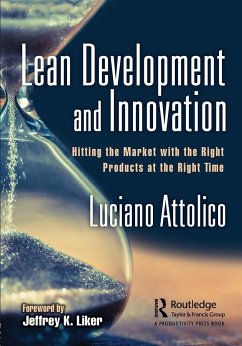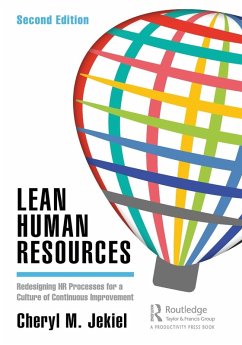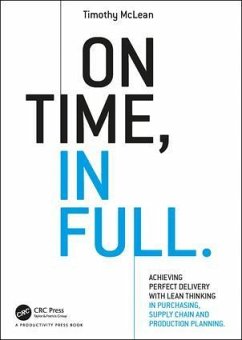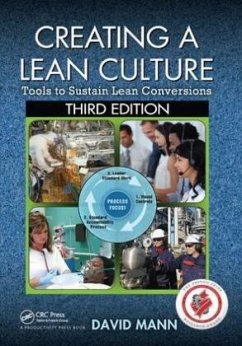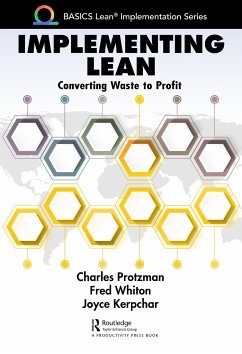Versandkostenfrei!
Versandfertig in 1-2 Wochen
Weitere Ausgaben:

PAYBACK Punkte
67 °P sammeln!





This book is not about debits, credits, or accounting theory. Instead, it describes how a chief financial officer (CFO) becomes a Lean CFO by leading a company in developing and deploying a Lean management system. The finance team, business executives, and Lean leaders will all benefit from its forward-thinking improvement approach.
After a tour of duty in public accounting, Nick Katko began his Lean management system career as chief financial officer of Bullard, a privately held manufacturing company in Kentucky. In the mid-1990s Bullard made a commitment to a Lean business strategy and began hiring operations people with Lean experience. Nick worked with Lean leaders to establish a comprehensive Lean performance measurement system that was used to measure and manage the entire business. As inventory was dramatically reduced, Nick realized the irrelevance of the standard costing system to the business. Nick created and introduced value stream income statements to Bullard, and all business decision making was based upon a value stream financial analysis of decisions. Eventually, labor and overhead rates were set to zero and inventory valuation was made with a simple monthly journal entry capitalizing manufacturing costs. In 2000, Nick left Bullard and started Strategic Financial Solutions, Inc., with his wife Deanna. Strategic Financial Solutions provides contract CFO and controller services as well as bookkeeping and tax services to companies in the Lexington, Kentucky area. While on Bullard's Lean journey, Nick read Making the Numbers Count by Brian Maskell. He liked the book so much he wrote Brian and told him about his own work with a Lean Management System. Nick and Brian talked regularly and, in 2002, Brian asked Nick to join BMA, Inc., as a senior consultant. As a senior consultant with BMA, Nick uses his experience to assist clients in Lean management implementation by working closely with them to resolve the real-world issues they face in implementation. These issues include removing traditional cost-based performance measurement systems in favor of Lean performance measurement systems, migrating from a traditional income statement to a value stream costing income statement, creating a transaction elimination maturity path, and working with management to create new business decision-making models based on Lean accounting practices. Nick has worked with a wide range of businesses, from multinational public companies to family-owned businesses around the world. He is the co-author of The Lean Business Management System: Lean Accounting Principles and Practices Toolkit (2007) as well as the BMA Lean Accounting Webinar Series. He is a regular presenter at the Lean Accounting Summit and the Lean Enterprise China Summit. Nick, a native of Sayreville, New Jersey, resides in Lexington, Kentucky with his wife, Deanna, and family. He holds a BS in accounting and an MBA in finance, both from the University of Kentucky, and is a certified public accountant.
Produktdetails
- Verlag: Taylor & Francis Ltd
- 2 ed
- Seitenzahl: 196
- Erscheinungstermin: 6. Februar 2023
- Englisch
- Abmessung: 235mm x 157mm x 15mm
- Gewicht: 388g
- ISBN-13: 9781032302416
- ISBN-10: 1032302410
- Artikelnr.: 66269603
Herstellerkennzeichnung
Libri GmbH
Europaallee 1
36244 Bad Hersfeld
gpsr@libri.de
"The Lean CFO is the best lean book I have read, and I have read them all. It is perfect for management teams looking to make a huge immediate impact."
"Nick explains The Lean CFO from direct experience. Experience as an accountant, as a practicing CFO, as a leading lean accounting thought leader and pioneer, and as a guide and coach to business executives leading their organizations to successful change. Nick has been there and done that for the lean organization and The Lean CFO is the guidebook and plan."
- Steven Vitale - President, Midwest Industrial Supply, Inc.
"Nick explains The Lean CFO from direct experience. Experience as an accountant, as a practicing CFO, as a leading lean accounting thought leader and pioneer, and as a guide and coach to business executives leading their organizations to successful change. Nick has been there and done that for the lean organization and The Lean CFO is the guidebook and plan."
- Jim Huntzinger - President and Founder, Lean
Mehr anzeigen
Frontiers
"Lean accounting is the essential backbone of a company's lean management system because it provides useable and understandable information that aligns lean operations with financial performance. Classical management accounting and cost management simply cannot meet the instant and immediate information requirements of a lean company. The Turkish Lean Institute has worked with Nick has worked several years and translated the first edition of The Lean CFO into Turkish. We highly endorse the second edition of this book."
"This book takes you on a journey which many would like to travel, and many may have started but not transitioned. Based on practical examples and case studies we get insights into how accounting can progress from transactional processing to a value added function for a lean company by bringing in the analytical skills of your accounting team to support the improvement journey."
"As a long-time lean practitioner, I am consistently frustrated with my inability to effectively communicate the wonders and benefits of lean to my financial counterparts. Low volume, high mix, flexible production seems to constantly conflict with standard cost accounting tools and processes. Enter the Lean CFO. Nick unlocks this disconnect and shows how the benefits of lean flow directly from the shop floor into clear and actionable financial statements. His writing is concise and makes these concepts simple and easy for the most skeptical finance professional to understand. The Lean CFO is required reading for our entire management team!"
"The Lean CFO informs us of the holistic approach we must take to achieve the greatest gains from Lean practices. Lean companies require a Lean management accounting system that focuses on flow and maximizing capacity. Nick offers executives a blueprint that is easy to understand and champion."
"Lean accounting is the essential backbone of a company's lean management system because it provides useable and understandable information that aligns lean operations with financial performance. Classical management accounting and cost management simply cannot meet the instant and immediate information requirements of a lean company. The Turkish Lean Institute has worked with Nick has worked several years and translated the first edition of The Lean CFO into Turkish. We highly endorse the second edition of this book."
- Yalçin Ipbüken - President, Lean Institute Turkey
"This book takes you on a journey which many would like to travel, and many may have started but not transitioned. Based on practical examples and case studies we get insights into how accounting can progress from transactional processing to a value added function for a lean company by bringing in the analytical skills of your accounting team to support the improvement journey."
- Kevin Bennett - Facilitator, Best Practice Network NSW and QLD, Australia
"As a long-time lean practitioner, I am consistently frustrated with my inability to effectively communicate the wonders and benefits of lean to my financial counterparts. Low volume, high mix, flexible production seems to constantly conflict with standard cost accounting tools and processes. Enter the Lean CFO. Nick unlocks this disconnect and shows how the benefits of lean flow directly from the shop floor into clear and actionable financial statements. His writing is concise and makes these concepts simple and easy for the most skeptical finance professional to understand. The Lean CFO is required reading for our entire management team!"
- Jud Barr - CEO, JTB Custom
"The Lean CFO informs us of the holistic approach we must take to achieve the greatest gains from Lean practices. Lean companies require a Lean management accounting system that focuses on flow and maximizing capacity. Nick offers executives a blueprint that is easy to understand and champion."
- Johnson McKnight - CEO, M&M International
Schließen
Für dieses Produkt wurde noch keine Bewertung abgegeben. Wir würden uns sehr freuen, wenn du die erste Bewertung schreibst!
Eine Bewertung schreiben
Eine Bewertung schreiben
Andere Kunden interessierten sich für





